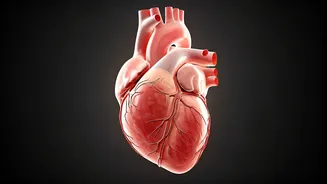Silent Heart Attack
A silent heart attack, often difficult to detect, can manifest through seemingly unrelated symptoms. Bloating and excessive burping are two of the less
obvious signals of potential heart issues. Experiencing chest discomfort, even if mild, warrants medical attention, as it may signify underlying heart problems. If one has these symptoms, consulting a healthcare professional is crucial for accurate diagnosis and timely treatment. Ignoring these signs can lead to serious consequences, underscoring the importance of proactive health monitoring.
Legs as Indicators
The legs can also provide vital clues about heart health. Certain warning signs in the legs could indicate an increased risk of heart problems. These include swelling, pain, or changes in skin color, which may be associated with poor circulation. If a person notices these symptoms in their legs, they should consult a doctor, as they may be early signs of cardiovascular issues. Prompt intervention is critical to prevent the progression of the disease and improve overall health. Regular check-ups and paying attention to bodily changes can significantly aid in early detection.
Importance of Awareness
Being informed about these silent warning signs is crucial for overall well-being. Knowing the potential signs and symptoms of a heart attack, even if they seem minor, can empower people to take charge of their health. Early detection allows for prompt medical intervention, such as medication, lifestyle changes, or other medical procedures. Promoting awareness and educating the public about heart health is important to reduce the incidence of heart-related diseases and improve patient outcomes. Regular screenings and adopting a healthy lifestyle are essential steps to take to maintain good heart health.
Lifestyle Modifications
Adopting a heart-healthy lifestyle plays a vital role in preventing heart problems. The foundation of a healthy lifestyle includes a balanced diet, regular exercise, and avoiding smoking and excessive alcohol consumption. Regular physical activity keeps the heart strong and promotes good blood circulation. Eating a diet that is low in saturated fats, cholesterol, and sodium, while rich in fruits, vegetables, and whole grains, can significantly improve heart health. It is essential to manage stress levels through techniques like meditation and yoga. These proactive steps can minimize heart-related risks and improve quality of life.
Seek Expert Advice
Consulting healthcare professionals is essential for any concerns regarding heart health. If a person experiences any of the mentioned symptoms, immediate medical evaluation is recommended. Doctors can conduct various tests to assess heart health, identify potential problems, and provide appropriate treatment plans. Following up with healthcare providers regularly is critical. These check-ups can detect problems in their early stages, improving the chances of successful outcomes. People should openly discuss their concerns and any family history of heart disease with their doctors to get comprehensive and personalized medical advice.















